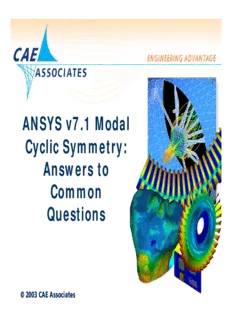
ANSYS v7.1 Modal C li S t Cyclic Symmetry - CAE Associates PDF
Preview ANSYS v7.1 Modal C li S t Cyclic Symmetry - CAE Associates
ANSYS v7.1 Modal CCyclliic SSymmettry: Answers to Common QQuueessttiioonnss © 2003 CAE Associates ANSYS V7.1 Modal Cyclic Symmetry: Answers to Common Questions Presented by: Computer Aided Engineering Associates, Inc. October 10, 2003 Presentation Goals Present a Brief Overview of ANSYS Modal Cyclic Symmetry. (cid:122) Address Common Questions Regarding the Procedures and the Related (cid:122) Commands. Discuss Potential Ways to Check for Proper Execution of the Procedures. (cid:122) Outline Potential Approaches for Modeling of Shroud Connections Using (cid:122) Cyclic Symmetry. Copyright 2003 Computer Aided Engineering Associates, Inc. 2 Computer Aided Engineering Associates, Inc. Presentation Topics Overview of ANSYS Modal Cyclic Symmetry (cid:122) Basic Assumptions/Restrictions (cid:122) Preprocessing Notes (cid:122) Sector Definition — CYCLIC Command — Recommended Checks — Solution Notes (cid:122) CYCOPT Command — Recommended Checks — Postprocessing Notes (cid:122) Unexpanded Results — /CYCEXPAND Command — CYCPHASE Command — Working with Part of the Model — Recommended Checks — Modeling Approaches for Shroud Interfaces (cid:122) Copyright 2003 Computer Aided Engineering Associates, Inc. 3 Computer Aided Engineering Associates, Inc. Overview Many structural components possess geometric characteristics which are (cid:122) repeated about an axis of symmetry (e.g. disks, gears, impellers). We can define the structure in terms of a primary segment which is repeated at equally spaced intervals about the symmetry axis. If the displacement BC’s of all segments are identical with respect to the axis of symmetry, we can analyze the entire structure in terms of the mass and stiffness characteristics of a single segment. This technique is called cyclic symmetry. (cid:122) Its primary advantage is large savings in CPU/elapsed time and computer (cid:122) resources. Copyright 2003 Computer Aided Engineering Associates, Inc. 4 Computer Aided Engineering Associates, Inc. Overview A proper sector represents a pattern that, if repeated n times in a (cid:122) cylindrical coordinate system, would yield the complete structure. Single sector modeled Display full model results Low Edge High Edge Copyright 2003 Computer Aided Engineering Associates, Inc. 5 Computer Aided Engineering Associates, Inc. Overview By using the ANSYS Modal Cyclic Symmetry capability we can obtain (cid:122) the natural frequencies and mode shapes of the entire structure for a user-prescribed range of nodal diameters using the model of a single sector. We can also perform Linear Buckling analysis using this technique. Cyclic symmetry is implemented in (cid:122) ANSYS by defining constraint relationships between the high and low edges of the basic sector. The basic sector is used twice to (cid:122) satisfy the required constraint relationship. The definition of the constraint (cid:122) equations depends on the "harmonic index" specified. Copyright 2003 Computer Aided Engineering Associates, Inc. 6 Computer Aided Engineering Associates, Inc. Overview The relationship between harmonic index, k, and nodal diameter, d, (cid:122) for a model consisting of n sectors is given by the following equation: = ⋅ ± = d m n k; m 0,1,2,3 K For example, if there are 7 sectors (n = 7) and we specify k = 2, ANSYS will obtain the solution for nodal diameters 2, 5, 9, 12, 16, 19, 23, . . . The harmonic index range is from 0 to n/2 ([n -1]/2 if n is odd). (cid:122) Copyright 2003 Computer Aided Engineering Associates, Inc. 7 Computer Aided Engineering Associates, Inc. Overview The equation relating nodal diameter, harmonic index, and (cid:122) number of sectors is shown in table form below: Harmonic Index Nodal Diameter k d 0 0 n n 2n 2n . . 1 1 n-1 n+1 2n-1 2n+1 . . 2 2 n-2 n+2 2n-2 2n+2 . . 3 3 n-3 n+3 2n-3 2n+3 . . 4 4 n-4 n+4 2n-4 2n+4 . . . . . . . . . . . . . . . . . . n/2 n/2 n/2 3n/2 3n/2 5n/2 . . (n even) (n-1)/2 (n-1)/2 (n+1)/2 (3n-1)/2 (3n+1)/2 (5n-1)/2 . . (n odd) Copyright 2003 Computer Aided Engineering Associates, Inc. 8 Computer Aided Engineering Associates, Inc. Overview D I H N/2 18 2N N/2 N 3N/2 18 22 40 58 62 ND A graphical representation of the table on the previous page is shown by this sawtooth,from which the harmonic index, required as input to ANSYS, can be determined by specifying the nodal diameter of interest. For example, a 58E driver exciting a rotor with 40 blades will elicit responses of 18, 22, 58, and 62, … nodal diameters, which will all be found in the ANSYS solution for harmonic index 18 Copyright 2003 Computer Aided Engineering Associates, Inc. 9 Computer Aided Engineering Associates, Inc.
Description: